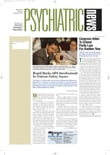The U.S. Food and Drug Administration granted final marketing approval to Eli Lilly and Co. for its new ADHD medication late last month. Atomoxetine, which will be marketed under the brand name Strattera, is the first novel medication to treat attention-deficit/hyperactivity disorder since the debut of methylphenidate more than 40 years ago.
Atomoxetine is a norepinephrine reuptake inhibitor and has little effect on brain dopamine metabolism. As such, it is not classified as a stimulant and will be marketed as a nonscheduled substance under the Controlled Substances Act (CSA). All other medications marketed for ADHD to date have been stimulants. Because of their theoretic addictive and abusive potential, they have been marketed under the restrictions of the CSA as Schedule II substances. Prescriptions for stimulant ADHD medications must be in writing and are not refillable. Because Strattera is not a controlled substance, none of these restrictions applies. Strattera is expected to be available in pharmacies in January.
“I expect that there will be considerable interest in atomoxetine since it is the first FDA-approved treatment for ADHD that is not a controlled substance,” commented David Fassler, M.D., APA trustee-at-large and a child and adolescent psychiatrist in Burlington, Vt. “It will certainly be helpful to have another option for treatment. However, the real key is to make sure that children receive a comprehensive evaluation and an accurate diagnosis. There’s no one simple answer or treatment that works for all children and all families.”
Strattera, in addition to being the first nonstimulant approved for the treatment of ADHD, is the first medication to be FDA approved for the treatment of adults with ADHD. Over the last decade studies have shown that ADHD is most commonly a lifelong disorder. Children do not “grow out of it,” as previously believed; however, some children with ADHD do develop compensatory mechanisms as they get older.
Atomoxetine’s effectiveness and safety have been demonstrated in at least six clinical trials involving more than 2,000 children and adolescents and 270 adults. The medication’s most common adverse reactions are abdominal discomfort, decreased appetite (which may translate over the long term into weight loss), dizziness, vertigo, irritability, and mood swings. Rare, minor increases in blood pressure and heart rate have also been observed.
Approved product labeling indicates that it may be prudent to monitor growth curves in pediatric patients, as well as heart rate and blood pressure in patients with any known cardiovascular disease.
Atomoxetine is metabolized by the CYP450-2D6 hepatic enzyme system. Patients taking other medications that inhibit the 2D6 enzyme (such as fluoxetine or paroxetine, among others) may experience decreased metabolism of atomoxetine and require dosage adjustments.
“The research presented thus far is certainly encouraging,” Fassler said, “but there’s obviously much more work to be done.”
More information about atomoxetine, including prescribing information, is posted on the Web at www.strattera.com. ▪
